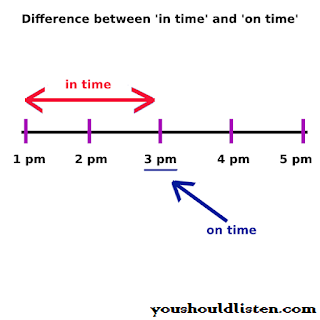What’s The Key Difference Between In Time And On Time ?
Time is a very important factor, not just in life, but also in English. If you are a working professional and you work under tight deadlines, more often than not, you will be hearing your superiors telling you to finish your works in time.
Some people also use the phrase, on time. I am pretty sure by now you would be confused whether to use ‘in time’ or ‘on time’ in your sentences. You are reading this article to get rid of this confusion, aren’t you? Let’s get to the point right away.
Let’s Look at an example
You can either use in time or on time in your sentences. But, both have different meanings. Imagine that your manager has given you a deadline to finish an activity. The deadline is 3 pm. The following is your manager’s dialogue.
“Hey buddy! I have assigned you a new activity. The deadline to finish this is 3 pm”.
To make your manager know that you will finish this activity without any delay, you are telling him one of the following.
- Hey manager! Don’t worry. I will finish this task in time.
- Hey manager! Don’t worry. I will finish this task on time.
If you are saying the first sentence, it means that you will finish the task before 3 pm that is the deadline.
If you are saying the second sentence, it means that you will finish the task exactly at 3 pm.
This means that ‘on time’ is the exact time mentioned and ‘in time’ is anytime before the mentioned time. I am pretty sure you would have watched flight advertisements that say, ‘on time, every time‘. This means that the flight will take off exactly at the mentioned time without any delays.
The following graph will give you a better understanding if you should say ‘in time’ or ‘on time’.

So When To Use In Time or On Time ?
the phrase “In time” nearly means “required” time. Like, the time required to accomplish a process. As An Example,
The Doctor Came in time to save the patient from dying.
“On time” means for a “fixed” or “Predecided” time.
He arrived on time for the movie ‘ 3:00 p.m. starting.
It’s possible, (though not likely), to be “on time” and not “in time.” That is, “He arrived on time for the bus’ (scheduled) 3:00 p.m. departure, but not “in time.” (The bus left 5 minutes early.)
So, I think you clearly understood when to use in time or on time now. If you still have doubts then refer to some below given examples.
Example sentences using in time / on time:
- The train that Vincent boarded departed on time.
- David is always good at finishing his assignments in time without any delays.
- Though there were just few days left for the opening of a world-class hospital in Ohio, officials were confident that they would get all the necessary medical equipment in time for the surgical procedures.
- Serena’s father who is on an official tour to London promised her that he would return home in time for her birthday party next week.
- Have you ever written an exam that did not start on time?



